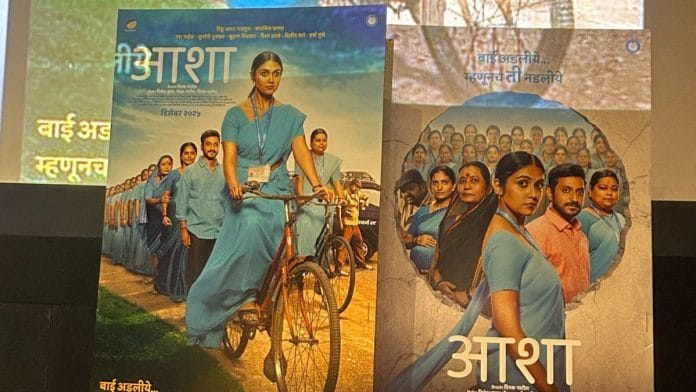Mumbai: When a Mumbai University professor went to Maharashtra’s Sakri taluka to conduct a gender sensitisation workshop two years ago, she confronted a litany of woes from the health department’s ASHA workers—from honorarium to working conditions.
“I was not the right person, but they went on passionately. I said, I can hear you out, and I can send your message to the right person where possible, and the discussion halted there,” Daivata Patil, who teaches advertising, media research, and management, said.
By the end of that year, Patil had found a solution to give a voice to their work and woes. She and her team started shooting a film on ASHA workers, which will hit the big screen in December this year.
The Marathi film, titled Asha, stars Rinku Rajguru of Sairat (2016) fame in the lead role of an ASHA worker, Malti, and takes the audience through her life—challenges at work, the satisfaction that she draws from her small victories in her job of helping other women, her resolve, and some heart-wrenching losses that she is not able to reconcile with. The film is directed by Deepak Patil, a young filmmaker, and co-produced by Nilesh Kuvar.
Through Malti’s story, the film also throws light on how ASHA workers often have to balance a demanding job with their own domestic problems—trouble with in-laws, financial problems, and the male gaze at the grassroots that labels a working woman as too forward, out of control.
“The story became entrenched in our minds so deeply that the first draft of the script was ready in a little over a month after we started working on it. We started shooting at the end of 2023. We want this film to reach the right target audience, and so we have been having small screenings for different groups,” Daivata Patil said, on the sidelines of one such screening at Inox in Nariman Point.
Organised last week by Dr. Shrikant Shinde Foundation with Shaina NC from the Eknath Shinde-led Shiv Sena taking the lead, the screening was among the biggest and the most special, Patil said. This audience was full of ASHA and anganwadi workers, who were watching their own lives playing out on reel.

Life of ASHA workers
The film shows Rajguru, draped in a stiff blue saree as Malti, cycling in the heat from village to village, spreading awareness about health and hygiene among women and children, informing households about children’s vaccinations, and helping pregnant women by putting them in touch with hospitals.
In one scene, Malti is seen talking to school girls about the benefits of using a sanitary napkin instead of a cloth napkin during their menstrual cycle—usually a conversation taboo in households, especially in the villages.
In another, she is sitting in a group of 25-30 ASHA workers, being trained by a doctor on how to identify signs of a risky pregnancy among women, and how young pregnant girls are most at risk. Malti puts the training to use. A girl, young enough to have just hit puberty, whom she usually buys flowers from, is pregnant, and Malti asks her to immediately visit the civil hospital.
Malti is shown to be strong-willed, ambitious, but equally sentimental and irascible. When the hospital is unable to save the young girl from a complicated pregnancy, Malti’s world breaks down, but she comes out of it with an even stronger resolve. In the second half of the film, she locks horns with a politically strong family, hell bent on having a baby boy to continue its lineage, to get the pregnant daughter-in-law the medical care that she needs against the elders’ wishes.
When the women in her village chide Malti for being out too late at work, she gives it back without a thought. “Do you ask your son the same question?”
Also read: Mother stole hospital supplies for Indian POWs in World War 2 Japanese camp: Subhashini Ali
Monetisation of care work
When someone asks Malti why she does such stressful work, she says it helps her sleep well at night.
While that may be true, ASHA workers across the country have one common grouse. They say they are compensated poorly for the kind of hardships they have to face at their work, and have to often resort to protests to demand an increase in their honorarium.
In Patil’s film Asha too, Malti is often seen borrowing small sums of money from a local grocer to make ends meet.
In Kerala, ASHA workers have been protesting for eight months, demanding that their monthly honorarium be increased from the current Rs 7,000 to Rs 21,000 and that they get a retirement benefit of Rs 5 lakh.
Patil said the problem lies in society seeing caregiving as an occupation that’s meant to give back to society, provide a social service.
“There are more than 13 lakh such workers across the country, and in Maharashtra, there are over 70,000. They are caregivers, and the problem is that the sector of caregiving is seen through the prism of social service. We should monetise caregiving as an industry and look at it from an economic perspective rather than just a social perspective, so that there is financial support to those who provide these caregiving services,” said Patil, whose first film as a producer, Barayan, was released in 2018.
Barayan showcased a teenager struggling under the pressure of 12th standard board examinations and doses of advice being liberally doled out by everything around him.
A female perspective
As a producer, Patil said, her presence helps in bringing a female perspective to films, especially when it comes to a script like Asha.
She said, however much we may like to deny it, saying the world has progressed, for a married woman to work, having the support of her family is extremely important, and Patil said her female lens to the script helped show some nuances.
For instance, Malti is in constant fights with her mother-in-law, who at one point also calls her “kaal tondi” (black-faced), and slams her for going out to work.
“She is criticising her daughter-in-law, but giving her a tiffin in her hand when she is leaving for work. This is her small show of support. As a woman producer, I think these small things were important,” Patil said.
Similarly, in one scene, Malti’s husband is casually seen dusting off cobwebs from the windows and the fan.
“It is only when there are such husbands can a woman step out of her house to work,” Patil said.
Back in Sakri taluka of Dhule, there is a real-life Malti, on whom Patil and her team based the lead character. She is just as strong-willed and sharp-tongued, but for now, the filmmakers want to keep her identity hidden.
She will come out with a flourish when the film releases in December.
(Edited by Ratan Priya)







👌👍❤️
Best wishes !! 💐